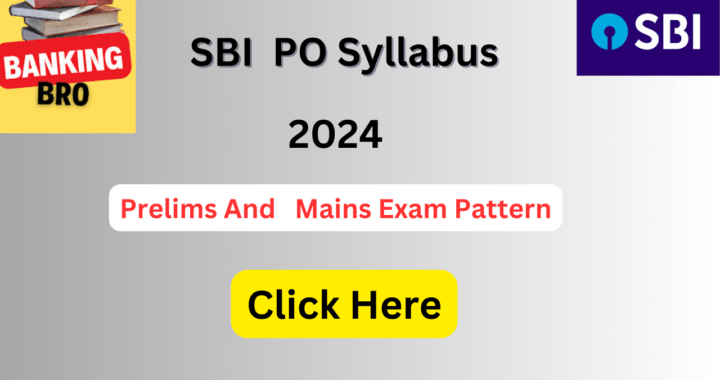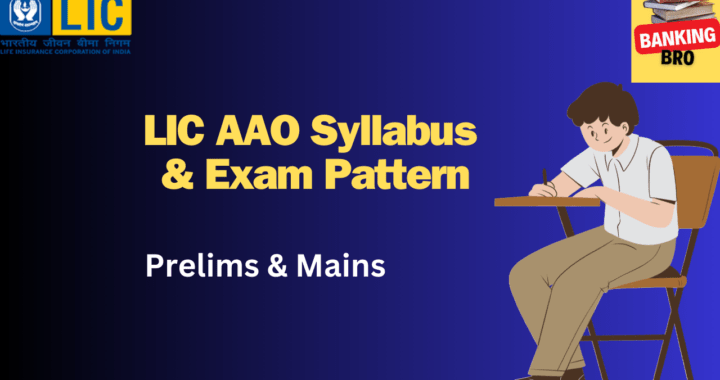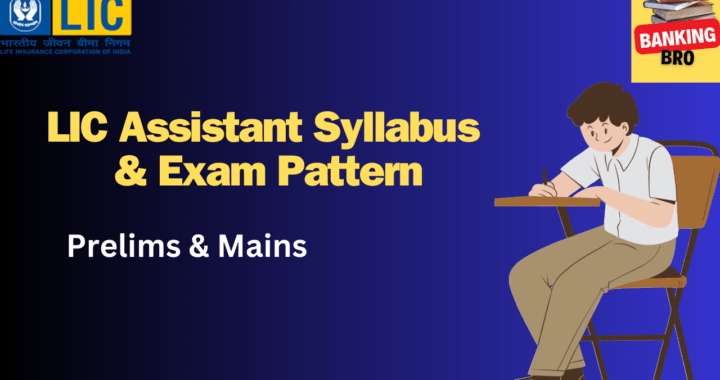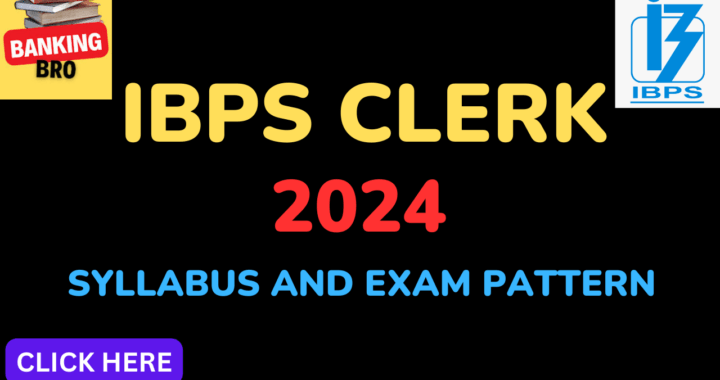Table of Contents
ToggleSBI PO Syllabus 2024 Prelims & Mains, Exam Pattern
SBI PO Syllabus;-
The SBI PO (State Bank of India Probationary Officer) exam syllabus typically covers various subjects to assess the candidates' aptitude and knowledge in different areas. Here's a general overview of the SBI PO syllabus:
SBI PO Prelims Syllabus 2024;-
The SBI PO (State Bank of India Probationary Officer) Preliminary Examination assesses candidates' aptitude in three main areas: English Language, Quantitative Aptitude, and Reasoning Ability. Here's a brief overview of the syllabus for each section:
- English Language:
- Reading Comprehension: Questions are asked based on a passage provided, testing understanding, inference, vocabulary, and critical analysis.
- Cloze Test: A passage is provided with certain words missing, and candidates need to fill in the blanks with appropriate words from the options given.
- Para jumbles: Candidates are required to arrange a set of sentences to form a coherent paragraph.
- Spotting Errors/Sentence Correction: Sentences with grammatical errors are given, and candidates need to identify and correct them.
- Fill in the Blanks: A sentence with one or more blanks is provided, and candidates need to fill in the blanks with appropriate words.
- Sentence Improvement: Sentences are provided with a part underlined, and candidates need to choose the correct option that improves the sentence's clarity and coherence.
- Vocabulary: Questions can include synonyms, antonyms, word meanings, idioms, and phrases.
- Grammar Rules: Candidates should have a good understanding of English grammar, including parts of speech, tense, voice, subject-verb agreement, etc.
- Quantitative Aptitude:
- Simplification/Approximation: Questions involve simplifying mathematical expressions or approximating values.
- Number Series: Series of numbers are given, and candidates need to identify the pattern and find the missing number.
- Quadratic Equations: Questions involve solving quadratic equations and determining the relationship between variables.
- Data Interpretation: Candidates need to interpret data presented in various forms like tables, graphs, charts, etc., and answer questions based on it.
- Data Sufficiency: Candidates need to analyze the given data and determine whether it is sufficient to answer the given questions.
- Arithmetic Topics: Questions can cover various topics in arithmetic such as percentage, profit & loss, simple & compound interest, ratio & proportion, time & work, time & distance, average, mensuration, etc.
- Miscellaneous Topics: This can include questions on partnership, probability, permutation & combination, etc.
- Reasoning Ability:
- Syllogism: Questions involve logical deduction based on given statements.
- Inequality: Candidates need to analyze the relationship between two elements based on given conditions.
- Blood Relations: Questions involve determining relationships between individuals based on given information.
- Direction Sense: Candidates need to determine directions or positions of objects or individuals based on given conditions.
- Coding-Decoding: Questions involve coding and decoding of words or phrases based on certain patterns or rules.
- Alphanumeric Series: Series of alphabets and numbers are given, and candidates need to identify the pattern and find the missing element.
- Seating Arrangement: Questions involve arranging individuals or objects in a particular order based on given conditions.
- Puzzle: Candidates need to solve puzzles involving arranging elements or solving logical problems.
- Input-Output: Questions involve analyzing the input-output sequence based on given operations or rules.
- Logical Reasoning: Questions can cover a wide range of logical reasoning topics such as statement and argument, statement and assumption, course of action, cause and effect, etc.
Candidates should allocate their preparation time according to their strengths and weaknesses in each section and practice regularly to improve their speed and accuracy. Additionally, staying updated with current affairs and general knowledge can also be beneficial, especially for the General Awareness section in the mains examination.
SBI PO Prelims Syllabus – Compiled
- Reading Comprehension
- Cloze Test
- Para jumbles
- Error Spotting
- Fill in the blanks
- Vocabulary based questions (synonyms, antonyms, word meanings)
Quantitative Aptitude:
- Number Series
- Simplification/Approximation
- Quadratic Equations
- Data Interpretation (Pie charts, Bar graphs, Line graphs, Tabular DI)
- Data Sufficiency
- Arithmetic topics (Profit and Loss, Time and Work, Time, Speed and Distance, Simple and Compound Interest, Averages, Ratio and Proportion, Percentage, Mensuration, Probability)
Reasoning Ability:
- Syllogism
- Blood Relations
- Direction sense
- Inequality
- Coding-Decoding
- Input-Output
- Order and Ranking
- Alphanumeric Series
- Puzzle and Seating Arrangement (Linear, Circular, Floor based, etc.)
- Miscellaneous (Logical Reasoning, Statement and Assumptions, Statement and Arguments, Statement and Courses of Action, Cause and Effect, etc.)

SBI PO Mains Syllabus 2024
We have mentioned below the detailed SBI PO mains syllabus for the candidates. Aspiring candidates can check the subject-wise syllabus of mains with the brief description of the topics.
SBI PO Mains English Syllabus
The SBI PO English syllabus is as follows.
The English language is a section that is common to both Prelims & Mains phases. Although the syllabus for prelims and mains is similar, the change is in the difficulty level of the paper. More emphasis is being put on Reading Comprehension & Cloze Test in the mains exam.
SBI PO Mains Data Analysis & Interpretation Syllabus
- Graph-Based Questions – This topic covers a pool of topics. Graphs can be based on Bar, pie-chart, tabular, linear. Pieces of information are given in one of these formats and are followed by a group of fo questions.
- Missing Case Data Interpretation – A table of information is given supported by a few statements which will have certain blocks empty. You will need to comprehend the information and fill the tables with suitable information.
- Data Sufficiency – Multiple statements are given based on which 1 or 2 conclusions are drawn. Figuring out if those given statements lead you to find answers or not will be the key.
- Permutations and Combinations – A set of information is given & conditions to choose the information are provided. The formation of questions is fairly direct and logical.
- Caselet DI – A caselet is nothing but a set of information given in paragraph form. No pictorial representation of information is used. Questions followed have to be answered based on the information.
- Probability – Probability questions will be formula-based often and sometimes direct but the level of the questions will vary.
General/Economy/Banking Awareness:
- Financial Awareness
- Current Affairs
- General Knowledge
- Static Awareness
- Banking and Financial Awareness
- Banking Terms
Reasoning & Computer Aptitude:
- Logical Reasoning
- Syllogism
- Input-Output
- Coding-Decoding
- Data Sufficiency
- Puzzle
- Seating Arrangement
- Coded Inequalities
- Blood Relations
- Ranking/Direction/Alphabet Test
- Tabulation
- Alphanumeric Series
- Data Sufficiency
- Coded Inequalities
- Verbal Reasoning
- Computer Aptitude
Descriptive Test:
- Letter Writing
- Essay Writing
- Precis Writing
SBI PO Preparation Strategy For Prelims & Mains
Preparing for the SBI PO exam, which is highly competitive, requires a strategic approach for both the prelims and mains exams. Here's a comprehensive preparation strategy:
Preliminary Exam Preparation:
- Understand the Exam Pattern: Know the exam pattern, marking scheme, and syllabus thoroughly to plan your preparation effectively.
- Build Strong Basics:
- Brush up on fundamental concepts in Quantitative Aptitude, Reasoning Ability, and English Language.
- Practice regularly to enhance speed and accuracy.
- Practice Mock Tests:
- Take regular mock tests to familiarize yourself with the exam pattern and to improve time management skills.
- Analyze your performance after each mock test to identify strengths and weaknesses.
- Focus on Time Management:
- Allocate specific time for each section during practice sessions.
- Solve questions within the time limit to improve speed and efficiency.
- Section-wise Preparation:
- Quantitative Aptitude: Focus on topics like simplification, number series, data interpretation, and quadratic equations.
- Reasoning Ability: Practice puzzles, seating arrangement, coding-decoding, and syllogism thoroughly.
- English Language: Work on grammar rules, vocabulary, comprehension, and error spotting.
- Revision:
- Regularly revise important formulas, shortcuts, and grammar rules.
- Solve previous years' question papers to understand the exam trend and difficulty level.
Main Exam Preparation:
- Advanced Study:
- Dive deeper into advanced topics of Quantitative Aptitude, Reasoning Ability, and English Language.
- Focus on topics like data interpretation, data sufficiency, logical reasoning, and reading comprehension.
- General Awareness:
- Stay updated with current affairs related to banking, economy, and finance.
- Read newspapers, magazines, and online resources regularly.
- Prepare static GK topics like history, geography, and science.
- Descriptive Test Preparation:
- Practice essay writing, letter writing, and precise writing.
- Focus on clarity, coherence, and correctness of language.
- Mock Tests and Analysis:
- Take full-length mock tests for mains to simulate exam-day conditions.
- Analyze your performance and work on weak areas.
- Time Management:
- Allocate time wisely among different sections based on your strengths and weaknesses.
- Prioritize questions that you can solve quickly and accurately.
- Professional Guidance:
- Consider joining a coaching institute or online course for expert guidance and personalized study plans.
- Revision and Consolidation:
- Revise all the important topics, formulas, and concepts multiple times.
- Consolidate your learning through regular revision and practice.
- Stay Calm and Confident:
- Maintain a positive attitude and stay confident throughout your preparation.
- Practice relaxation techniques to manage exam stress effectively.
SBI PO Exam Pattern 2024
The written phase of the SBI PO selection process consists of two stages- Prelims and Mains. The detailed exam pattern of each stage is given below.
SBI PO Prelims Exam Pattern
The exam pattern for SBI PO prelims ;-
| S.NO. | Name Of Subjects | NO. Of Questions | Maximum marks | Duration |
|---|---|---|---|---|
| 1 | English Language | 30 | 30 | 20 Min |
| 2 | Quantitative Aptitude | 35 | 35 | 20 Min |
| 3 | Reasoning Ability | 35 | 35 | 20 Min |
| TOTAL | 100 | 100 | 100 | 1 hour |



